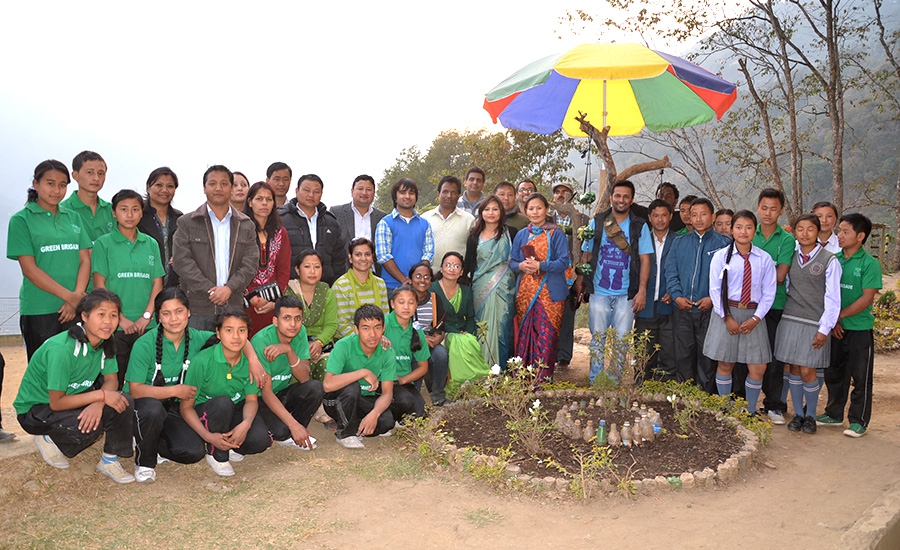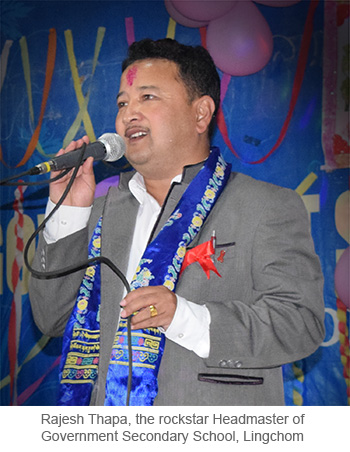
Deep inside Sikkim, students of a nondescript government school, led by their headmaster, are quietly nurturing their surrounding and redefining India’s pet mission, Swachh Bharat, even as they find their own interpretation of solid waste management. In the last six decades of its existence, the Government Secondary School, Lingchom, has never had students who cared so much about the environment. Visitors to the school are greeted by an eye-catchingschool gate made of recycled plastic bottles. Even when funds are low, it’s the ideas that keep the school going. Take for instance, the mini amphitheatre which has been created out of old useless tyres. On a regular basis, as a part of the routine, students collect waste from the village such as plastic bags, bottles, paper napkins, clothes, sweet packets, CDsetc. and turn it into useful and beautiful objects. Thanks to these efforts, the waste generated in Lingchom, a small village in west Sikkim with a population of 2,040 as per the 2011 Census, has reduced drastically.
Leading the enterprising children is the headmaster of the school, Rajesh Thapa, who believes that an individual effort can ‘make the world a better place’. Thapa, 46, was born in Kurseong district of Darjeeling. After his education in Darjeeling, he took up teaching, making it his life’s mission.
Rajesh Thapa tells NE Travel and Lifewhat it takes to make a difference.
Tell us abit about the school and your students
Most of our students come from rural background and are eager and ready to carry out environmental drills like plantation, manuring, weeding and cleaning. That’s because they are accustomed to these kinds of activities. I see that as a big advantage and what we do is help them channelise their energy towards loving and caring for the environment.
How did this awareness come about?
We have been working towards a better environment, chiefly touched by the maxim that ‘degradation of the environment is a global problem, but, the solutions are entirely local’. We were further inspired by the works of our chief minister, who has always been environment-conscious in his works and speeches.
Under your leadership, what did you do to inculcate environmental values?
Value education is a regular programme in our school calendar. Apart from teaching human values, we emphasise on the teaching of environmental values. For a long time, we have had an Eco Club in school that involves students from Standard VI onward. We engage them in plantations during rainy seasons. After I took charge as the Headmaster, I started to revamp the club and increased its activities. We associated with agencies like ENVIS which involved us in programmes like National Environment Awareness Campaign and Green School Programme. All important environment related occasions like World Science Day, Water Day, Biodiversity Day, Ozone Day, to name a few, are observed chiefly for awareness. In June, on World Environment Day, we observe 10 minutes of silence to earth(done in Sikkim only)and on Paryawaran Mahotsav, we plant trees at selected places.
What are your first steps in waste management and how did you implement them?
In 2010, we had planned to engage our students in making of crafts from waste materials and in 2011, we conducted a plastic collection drive in our village. We were shocked to see the collection of thousands of bottles and oil canisters from a small village of around 150 households. We used those oil canisters as flower pots, and they are still being utilised. Cold drink bottles were used in construction sites and for making crafts and useful tools. All unusable stuffs were dumped under a concrete platform that we constructed for outdoor programmes.
For the plantation programmes, we decided to plant trees and flowers systematically. We identified places to plant tall trees and flowering trees in different places, so as to minimise the possibility of threats. We avoided tall trees in the school campus as they might become risky for the buildings. Till now, we have been able to grow a nice forest in the local crematorium which was once barren.It now has more than 300 alnus trees planted by our Eco Club.We have now adapted another crematorium nearby for plantation. This year we planted 150 alnus saplings there.In 2012, we planted around 100 trees on a small piece of barren land that belongs to the school.We avoid random plantations so as to minimise the chance of felling them down at a later stage.
Tell us more about your Green Brigade
 Presently, we have a Green Brigade of 25 students, who are literally selected to perform plantation and other activities. They work on off days when the need arises. We also have a water brigade that mends leaking pipes and takes care of the water sources.Segregating wastes and reusing them in all possible way is a regular activity.
Presently, we have a Green Brigade of 25 students, who are literally selected to perform plantation and other activities. They work on off days when the need arises. We also have a water brigade that mends leaking pipes and takes care of the water sources.Segregating wastes and reusing them in all possible way is a regular activity.
What are the challenges in implementing those steps?
Since our students mostly belong to working class families, it’s always difficult to engage them during holidays. Our pace of work is, therefore, slow. There is lack of awareness in the general public about the harmful effects of plastics, over-use of edible oils and junk foods containing MSG. Looking at this, we have started to talk to the parents about all these hazards.
What have you learntin the course of your journey in bringing about a change in Lingchomp?
People have started to understand the motivebehind my cleanliness and green drive. Nowadays, many people have started to reuse their waste plastics at home. Whenever I see flower pots made out of canisters and other waste materials in my neighbourhood, I make it a point to go to the person and thank him/her for the work. One very important lesson that I learnt through all this is that good begets good.
In 2011 and 2014, the school was awarded for its initiative. What difference has it made in your journey towards being environmentally conscious and aware?
The Green School awards are given by the government of Sikkim every year to selected schools for their work towards the environment. The two awards that we received in 2011 and 2014 have helped us do many new things in school. The recognition we got from these awards has helped us in conducting the programmes on a large scale. We could conduct many awareness programmes for the students and local people. In turn, it has helped fuel interest in people to take care of their surroundings. This is rewarding and encouraging.
Is your model of work and that of the school replicable in other schools of India? How can others emulate your effort?
Ofcourse, it is. We haven’t been doing things that are difficult for our students. They voluntarily come out to carry out the tasks. Our co-curricular activities like seminars and debates largely focus on waste management and environment. Students are encouraged to make crafts out of wastes. We have an outdoor classroom, made up of old tyres, that encourages the use of low or no cost materials. Infact, we have learnt from a few other schools of the state that are doing commendable environmental activities
What are your future plans for waste management as far as the school goes?
We plan to involve the parents in our work. Since our health directly depends on our habits, we have been planning to conduct more and more awareness programmes on the hazards of plastics and other materials. We are encouraging people to refuse unnecessary plastic and paper packaging. We have started to donate steel glasses to institutes and local NGOs, so that they stop using plastic and paper cups in their programmes.
We are also trying to procure one paper recycling machine for the school. If it’s done, then we will be able to recycle the large volume of paper waste generated by institutes and offices in the vicinity.
Finally, how were you inspired to do this work towards waste management?
This realisation that everyone just needs to work locally so that the environment of the world becomes cleaner and greener was enough to motivate me to start working. Hopefully, all people think like this and then the world will become a better place to live.

